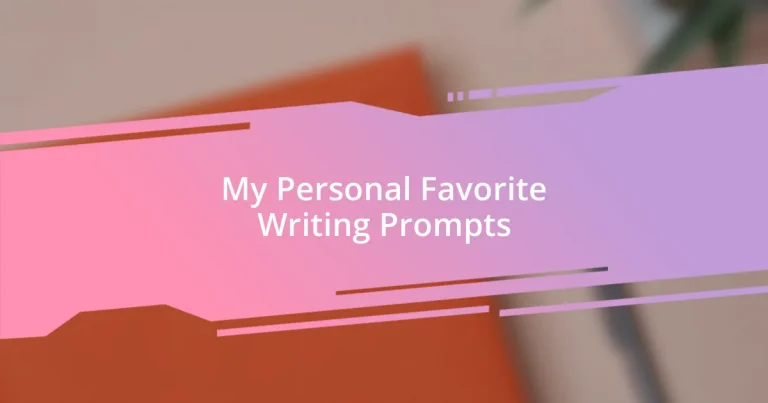Key takeaways:
- Writing prompts enhance creativity by offering fresh perspectives and breaking monotony in storytelling.
- They provide structured practice, making writing more manageable and allowing for emotional exploration.
- Diverse types of prompts can lead to personal discovery, fostering deeper connections to one’s experiences and identity.
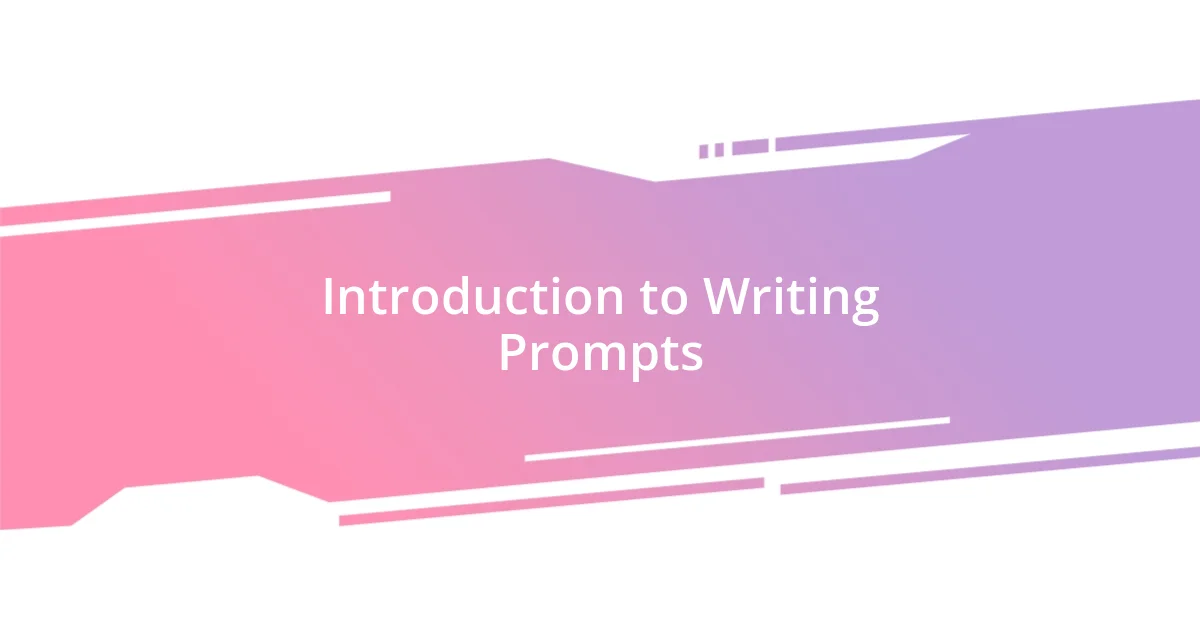
Introduction to Writing Prompts
Writing prompts serve as powerful catalysts for creativity, helping to unlock ideas that may remain hidden in our minds. I remember sitting down one rainy afternoon, feeling uninspired, when I stumbled upon a prompt that asked, “What would you say to your childhood self?” That simple question opened a floodgate of memories and emotions, allowing me to explore themes I hadn’t considered before.
Often, we can get stuck in comfortable patterns, making it challenging to push beyond our limits. Have you ever felt like you were rewriting the same story over and over? I certainly have. Writing prompts can shake up that monotony and push us to think outside the box, whether it’s a quirky scenario or a thought-provoking question. They encourage exploration and experimentation, even in genres you might not typically write in.
Additionally, writing prompts are more than just a tool; they are a chance to discover new facets of our creativity. It’s exciting to think that each prompt could lead to unexpected insights or even a story that resonates deeply with others. When I engage with a prompt, I often find myself learning something new about my own thoughts and feelings, which is a rewarding journey in itself.

Benefits of Using Writing Prompts
Using writing prompts can significantly boost your creativity. I’ve often found that a small nudge in the right direction can transform a blank page into a world of possibilities. For instance, one evening, I read a prompt about creating a character who suddenly inherits a mysterious object. That idea spiraled into a weekend of brainstorming and writing, where I crafted an entire backstory that I never would have imagined on my own.
Another benefit is the structured practice they provide for writers. Sometimes, it’s easy to get overwhelmed by the thought of writing an entire book or an article. Prompts break this daunting task into manageable bits, helping me focus on one idea at a time. I distinctly recall my first experience with a prompt that simply stated, “Describe a place you love.” Answering this made it easier for me to later expand it into a fuller narrative about my childhood backyard—not a monumental task, yet deeply rewarding.
Finally, writing prompts can reconnect you with your emotions and experiences. They often elicit a visceral response, sometimes leaving me reflecting on my own life. When one prompt asked me to write about a defining moment, I realized that revisiting those moments wasn’t just enlightening; it was therapeutic. Through this process, the act of writing not only showcases my evolution as a writer but also as a person.
| Benefit | Description |
|---|---|
| Boosts Creativity | Prompts inspire new ideas and perspectives, facilitating explorations that may not surface in routine writing. |
| Provides Structure | They break larger writing tasks into manageable segments, allowing focused creativity and manageable practice. |
| Reconnects with Emotions | Engaging with prompts can lead to deep personal reflections, enhancing emotional connection in writing. |
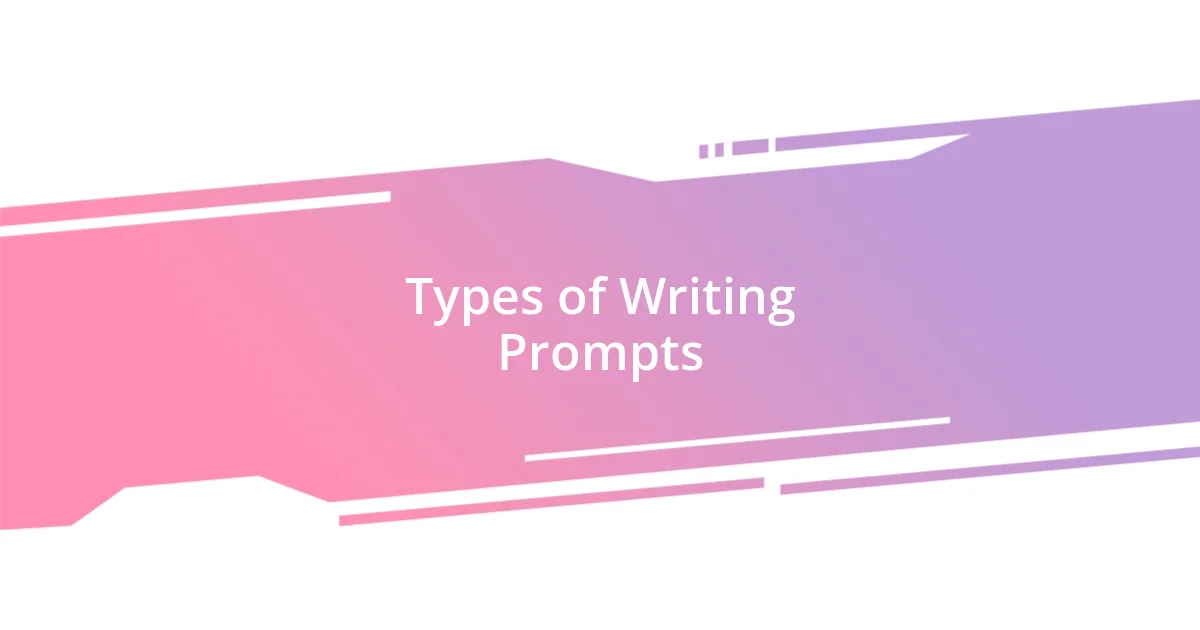
Types of Writing Prompts
Writing prompts come in various types, each designed to spark different aspects of creativity. For instance, character-driven prompts invite us to delve deep into the psyche of an individual, while scenario-based prompts present a specific situation that challenges our imagination. I remember being captivated by a prompt that asked me to write about a day in the life of someone with an unusual job. It pushed me to step into a unique perspective and explore aspects of life I had never considered.
Here are some common types of writing prompts that I find particularly inspiring:
- Character Prompts: Focus on developing specific characters with unique traits or backgrounds.
- Scenario Prompts: Introduce a particular situation or conflict to explore, often leading to surprising outcomes.
- Dialogue Prompts: Provide snippets of conversation for writers to expand into a larger story, honing dialogue skills.
- Descriptive Prompts: Encourage vivid imagery by asking writers to describe a scene, feeling, or object in detail.
- Theme Prompts: Center around universal themes such as love, loss, or identity, allowing for deep explorations of human experience.
The diversity in prompts doesn’t stop there. They can also touch on personal experiences, memories, or societal issues. Recently, I spun a story from a prompt that urged me to reflect on a turning point in my life. Writing about it unearthed emotions I’d tucked away. I realized how powerful personal stories can be, transforming a simple prompt into a heartfelt narrative.
In conclusion, whether your goal is to grow your creative muscle or to explore deeper themes, diverse writing prompts can serve as stepping stones into new worlds of thought and feeling. Keeping an open mind about the type of prompt you engage with can lead to unexpected discoveries about yourself and your writing style.

Daily Writing Prompt Ideas
Daily writing prompts are an excellent way to add variety to your writing routine. One of my favorite prompts challenges you to write about an object in your room and the memories it evokes. I did this once with an old camera, and suddenly I was reminiscing about family trips, the joy of capturing moments, and the lessons I’ve learned about life through photography. It’s amazing how a simple item can unearth a cascade of emotions and stories.
Another idea I enjoy is to craft a short story based on an unexpected event. I remember taking a walk when a sudden rainstorm caught me off guard. That experience prompted me to write about a character who finds themselves in an unfamiliar city, stranded by a storm and encountering chance meetings that change their life. It’s interesting how real-life experiences can morph into imaginative tales when we apply a prompt that encourages us to explore the “what ifs” of our situations.
Don’t underestimate the power of reflective prompts, too. Try writing a letter to your future self, discussing your hopes, aspirations, and fears. I did this exercise, and it felt like opening a window to my soul. I found myself delving into desires I had forgotten and grounding my current dreams in reality. It’s a breathtaking way to explore your emotions, helping you connect the dots between who you are and who you want to become.
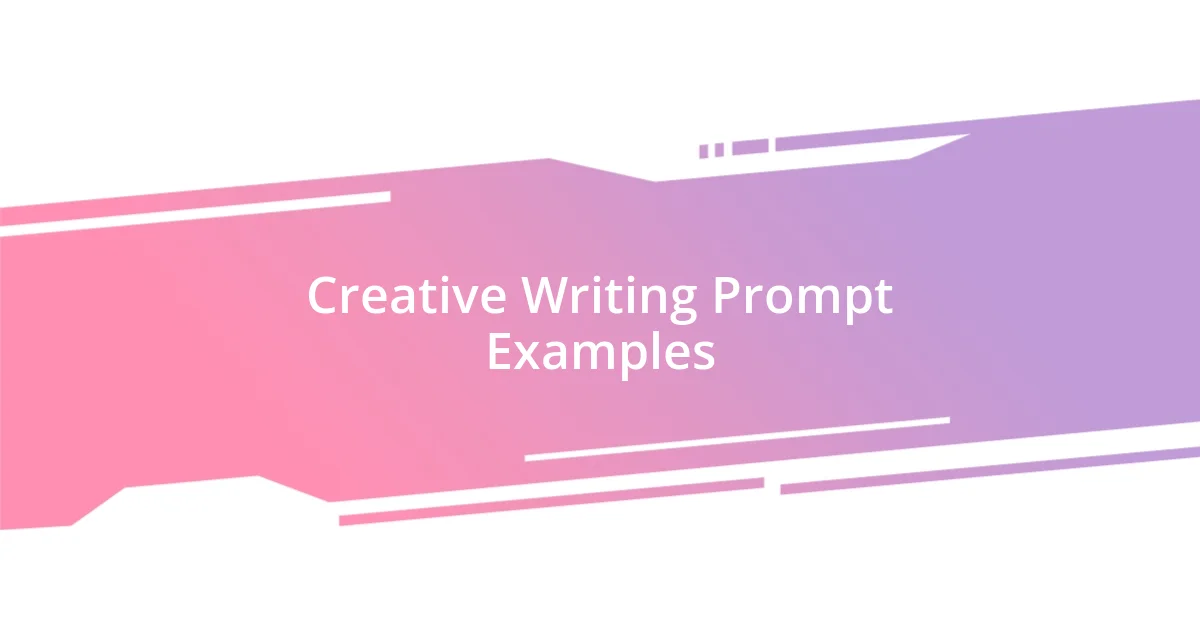
Creative Writing Prompt Examples
One creative writing prompt that has sparked my imagination is to write from the perspective of an inanimate object. Imagine a chair witnessing the comings and goings of a busy family life. I once tried this with an old rocking chair that belonged to my grandmother. It was remarkable to explore the stories that chair could tell—quiet moments of solace as well as lively gatherings, reflecting the hidden emotions woven into its wooden frame. It made me wonder, what stories do the objects around us silently carry?
Another favorite prompt of mine is to create a story beginning with the line, “It was a day unlike any other.” This line invites endless possibilities and can lead to thrilling adventures or introspective moments. I once launched into a tale where a character discovers a hidden letter that sends them on a quest through their hometown, uncovering long-buried family secrets. This experience reminded me how starting with a simple premise can open up a floodgate of creativity, encouraging me to tap into the unexpected twists of life.
Finally, I often suggest trying a sensory prompt that asks you to write about a scene using all five senses. I remember crafting a piece where I described a bustling market, rich with scents of spices, sounds of vendors calling out, and sights of vibrant colors. Immersing myself in that vivid details allowed me to not only create an engaging scene but also evoke nostalgic feelings from my own experiences at local markets. Have you ever taken a moment to really notice the world around you? It’s astonishing how deeply layered our surroundings can be when we allow ourselves to explore through writing.
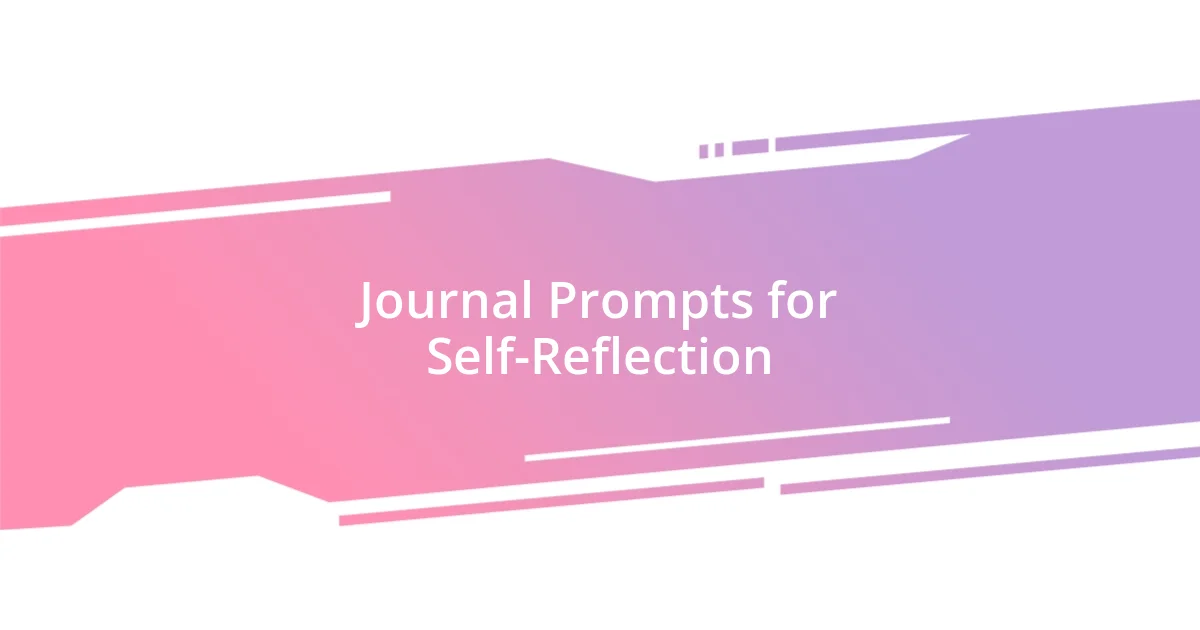
Journal Prompts for Self-Reflection
One powerful journal prompt for self-reflection is to write about a time when you overcame a challenge. I recall a period in my life when I struggled with anxiety and decided to confront public speaking. Writing about that experience allowed me to dive deep into my feelings of fear, growth, and triumph. How did that challenge shape the person I am today? It’s fascinating to realize that some of our most daunting moments can serve as pivotal turning points.
Another prompt I’ve found enlightening is to list the things you’re grateful for and then explore why each one matters to you. A while back, I wrote about my appreciation for a close friend who always supported me during tough times. As I reflected, I uncovered layers of connection and shared memories, which deepened my understanding of our bond. This practice brings so much clarity to what’s truly important in our lives, doesn’t it?
Additionally, consider writing about a moment that made you laugh recently. I’ve had an experience where I did something clumsy in front of my family, and we all erupted in giggles. When I penned that memory, it reminded me of the joy that humor brings amidst life’s ups and downs. Reflecting on these light-hearted moments can truly illuminate the beauty of everyday life, making you appreciate the laughter that punctuates our journeys. What moment brought a smile to your face today?
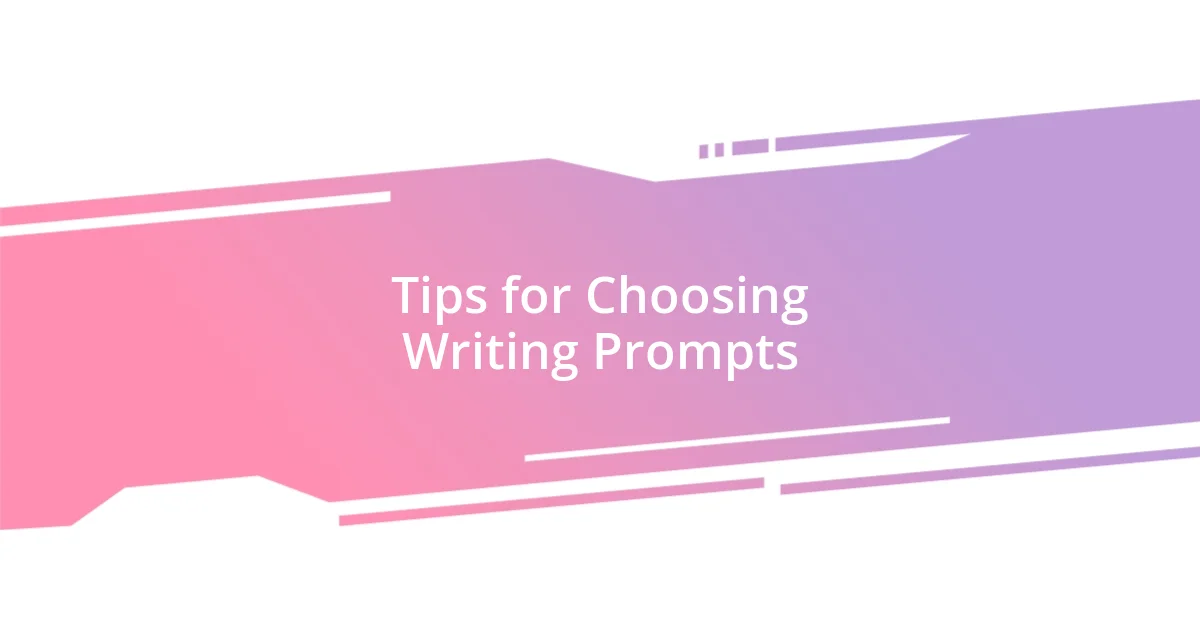
Tips for Choosing Writing Prompts
Choosing the right writing prompt can be a game changer in your creative journey. I often reflect on my mood or current interests; for example, if I’m feeling nostalgic, I might choose a prompt that evokes memories. This connection can ignite inspiration and make the writing process more enjoyable. Have you ever noticed how your feelings influence the themes you gravitate towards?
It’s also beneficial to select prompts that challenge you. I remember tackling a prompt that asked me to write a short story without using a single emotional adjective. This constraint forced me to dig deeper into my narrative techniques, pushing me to convey feelings through action and dialogue instead. It was hard, but I walked away with new skills—and a sense of accomplishment. What’s a challenge you’ve taken on in your writing lately?
Finally, I believe it’s crucial to pick prompts that resonate personally. I once came across a prompt about exploring a family heirloom’s backstory. Delving into my grandmother’s vintage locket turned into a profound exploration of legacy and identity. It reminded me how memories of tangible items can shape our narratives, making them more intimate. What objects in your life hold stories waiting to be told? These connections can transform a simple prompt into a lifelong creative endeavor.












